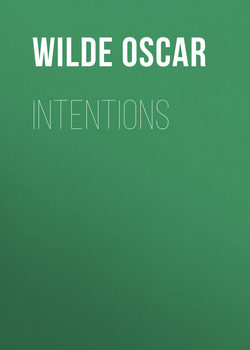Intentions

Реклама. ООО «ЛитРес», ИНН: 7719571260.
Оглавление
Wilde Oscar. Intentions
THE DECAY OF LYING: AN OBSERVATION
PEN, PENCIL AND POISON. A STUDY IN GREEN
THE CRITIC AS ARTIST. WITH SOME REMARKS UPON THE IMPORTANCE OF DOING NOTHING
THE CRITIC AS ARTIST. WITH SOME REMARKS UPON THE IMPORTANCE OF DISCUSSING EVERYTHING
THE TRUTH OF MASKS. A NOTE ON ILLUSION
Отрывок из книги
It has constantly been made a subject of reproach against artists and men of letters that they are lacking in wholeness and completeness of nature. As a rule this must necessarily be so. That very concentration of vision and intensity of purpose which is the characteristic of the artistic temperament is in itself a mode of limitation. To those who are preoccupied with the beauty of form nothing else seems of much importance. Yet there are many exceptions to this rule. Rubens served as ambassador, and Goethe as state councillor, and Milton as Latin secretary to Cromwell. Sophocles held civic office in his own city; the humourists, essayists, and novelists of modern America seem to desire nothing better than to become the diplomatic representatives of their country; and Charles Lamb’s friend, Thomas Griffiths Wainewright, the subject of this brief memoir, though of an extremely artistic temperament, followed many masters other than art, being not merely a poet and a painter, an art-critic, an antiquarian, and a writer of prose, an amateur of beautiful things, and a dilettante of things delightful, but also a forger of no mean or ordinary capabilities, and as a subtle and secret poisoner almost without rival in this or any age.
Before this, however, he seems to have been carried away by boyish dreams of the romance and chivalry of a soldier’s life, and to have become a young guardsman. But the reckless dissipated life of his companions failed to satisfy the refined artistic temperament of one who was made for other things. In a short time he wearied of the service. ‘Art,’ he tells us, in words that still move many by their ardent sincerity and strange fervour, ‘Art touched her renegade; by her pure and high influence the noisome mists were purged; my feelings, parched, hot, and tarnished, were renovated with cool, fresh bloom, simple, beautiful to the simple-hearted.’ But Art was not the only cause of the change. ‘The writings of Wordsworth,’ he goes on to say, ‘did much towards calming the confusing whirl necessarily incident to sudden mutations. I wept over them tears of happiness and gratitude.’ He accordingly left the army, with its rough barrack-life and coarse mess-room tittle-tattle, and returned to Linden House, full of this new-born enthusiasm for culture. A severe illness, in which, to use his own words, he was ‘broken like a vessel of clay,’ prostrated him for a time. His delicately strung organisation, however indifferent it might have been to inflicting pain on others, was itself most keenly sensitive to pain. He shrank from suffering as a thing that mars and maims human life, and seems to have wandered through that terrible valley of melancholia from which so many great, perhaps greater, spirits have never emerged. But he was young – only twenty-five years of age – and he soon passed out of the ‘dead black waters,’ as he called them, into the larger air of humanistic culture. As he was recovering from the illness that had led him almost to the gates of death, he conceived the idea of taking up literature as an art. ‘I said with John Woodvil,’ he cries, ‘it were a life of gods to dwell in such an element,’ to see and hear and write brave things: —
.....
It is impossible not to feel that in this passage we have the utterance of a man who had a true passion for letters. ‘To see and hear and write brave things,’ this was his aim.
Scott, the editor of the London Magazine, struck by the young man’s genius, or under the influence of the strange fascination that he exercised on every one who knew him, invited him to write a series of articles on artistic subjects, and under a series of fanciful pseudonym he began to contribute to the literature of his day. Janus Weathercock, Egomet Bonmot, and Van Vinkvooms, were some of the grotesque masks under which he choose to hide his seriousness or to reveal his levity. A mask tells us more than a face. These disguises intensified his personality. In an incredibly short time he seems to have made his mark. Charles Lamb speaks of ‘kind, light-hearted Wainewright,’ whose prose is ‘capital.’ We hear of him entertaining Macready, John Forster, Maginn, Talfourd, Sir Wentworth Dilke, the poet John Clare, and others, at a petit-dîner. Like Disraeli, he determined to startle the town as a dandy, and his beautiful rings, his antique cameo breast-pin, and his pale lemon-coloured kid gloves, were well known, and indeed were regarded by Hazlitt as being the signs of a new manner in literature: while his rich curly hair, fine eyes, and exquisite white hands gave him the dangerous and delightful distinction of being different from others. There was something in him of Balzac’s Lucien de Rubempré. At times he reminds us of Julien Sorel. De Quincey saw him once. It was at a dinner at Charles Lamb’s. ‘Amongst the company, all literary men, sat a murderer,’ he tells us, and he goes on to describe how on that day he had been ill, and had hated the face of man and woman, and yet found himself looking with intellectual interest across the table at the young writer beneath whose affectations of manner there seemed to him to lie so much unaffected sensibility, and speculates on ‘what sudden growth of another interest’ would have changed his mood, had he known of what terrible sin the guest to whom Lamb paid so much attention was even then guilty.
.....